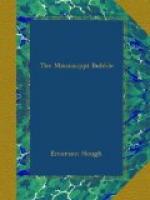He found the Lady Catharine Knollys changed from a light-hearted girl to a maiden tall, grave, reserved and sad, offering no reproaches, listening to no protestations. Told of Sir Arthur Pembroke’s horrible death, she wept with tears which his survivor envied. Told at length of the little child, she sat wide-eyed and silent. Approached with words of remorse, with expostulations, promises, she shrank back in absolute horror, trembling, so that in very pity the wretched young man left her and found his way out into a world suddenly grown old and gray.
After this dismissal, Law for many months saw nothing, heard nothing of this woman whom he had wronged, even as he received no sign from the woman who had forsaken him over seas. He remained away as long as might be, until his violent nature, geyser-like, gathered inner storm and fury by repression, and broke away in wild eruption.
Once more he sought the presence of the woman whose face haunted his soul, and once more he met ice and adamant stronger than his own fires. Beaten, he fled from London and from England, seeking still, after the ancient and ineffective fashion of man, to forget, though he himself had confessed the lesson that man can not escape himself, but takes his own hell with him wherever he goes.
Rejected, as he was now, by the new ministry of England, none the less every capital of Europe came presently to know John Law, gambler, student and financier. Before every ruler on the continent he laid his system of financial revolution, and one by one they smiled, or shrugged, or scoffed at him. Baffled once more in his dearest purpose, he took again to play, play in such colossal and audacious form as never yet had been seen even in the gayest courts of a time when gaming was a vice to be called national. No hazard was too great for him, no success and no reverse sufficiently keen to cause him any apparent concern. There was no risk sharp enough to deaden the gnawing in his soul, no excitement strong enough to wipe away from his mind the black panorama of his past.
He won princely fortunes and cast them away again. With the figure and the air of a prince, he gained greater reputation than any prince of Europe. Upon him were spent the blandishments of the fairest women of his time. Yet not this, not all this, served to steady his energies, now unbalanced, speeding without guidance. The gold, heaped high on the tables, was not enough to stupefy his mind, not enough though he doubled and trebled it, though he cast great golden markers to spare him trouble in the counting of his winnings. Still student, still mathematician, he sought at Amsterdam, at Paris, at Vienna, all new theories which offered in the science of banking and finance, even as at the same time he delved still further into the mysteries of recurrences and chance.




